De Duitse dichter en schrijver Thomas Kling werd geboren op 5 juni 1957 in Bingen. Zie ook alle tags voor Thomas Kling op dit blog.
Bildprogramme
2
MITSCHNITT CALVENSCHLACHT
inzwischn: 1499. luftbilder, -spiegel,
spiegelungn ausm engadinerkrieg. ein
sommerlicher brückenkopp (gesprengt) so
nimmt das wasser andre farbe an.
di gute
geschoßverschraubte luft! im luftzug
NAPALMHEIDE / das in den fluß
zischt, nähte zwischen leib und panzern
zieht (»da ist ja keine landschaft mehr«,
TONLOS / »hättns sollen fahren
lassn«). darüber geht di kamera, ho-
lpernd; kamerafahrt heiser, angekro-
chenes aug. vorm ortler. vor schi-
mmerndn 3000ern: demolirte sand-
sackberge (…)
und sorgnfaltn, kummer-
volles redaktörsgesic’t: ICH HÖRE EBEN!,
ICH RUFE WILLIBALD PIRKHEIMER
(sonst in Nürnberg stationiert)!, am sattel, AM HU-
MANISTISCHEN SATTELLITTNTELEPHON:
PIRKHEIMER: ja, hier pirkheimer. humanitär-
sanitäre verhältnisse … mit grawenvollen bildern
zu tun … habn hohe-luste zu zeichnen … di
geiselerschießung von meran … (FADING),
obwohl bevölkerun’ dagegn … (RAUSCH-
RAUSCH), im -iegesrausch, durchrau-
schende flüchtlinge … strom weg, alles weg …
KAISER MAXIMILIAN SOLL GEWEINT
HABN ALS / FADING /DI KINDER ESSENZ /
BROTKLEE VON DEN WIESN da br-
icht
di leitun’ zamm, damundherrn, in weißm rau-
schn, klappt zusamm das bilderwelt in riesen OH-
NELÖSCHLÖSCH. romanisch di bandnwerbun’
Gottes, tonlos di engel vorm himml. jerusalem, wei-
ße bänder spruchbänder in händn. ohne text.
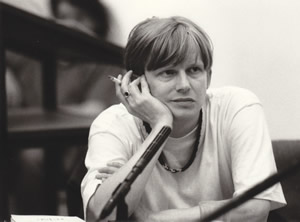
Thomas Kling (5 juni 1957 – 1 april 2005)
De Franse feministische schrijfster, dichteres, professor, filosoof, literair criticus en historica Hélène Cixous werd geboren in Oran, Algerije, op 5 juni 1937. Zie ook alle tags voor Hélène Cixous op dit blog.
Uit: Gare d’Osnabrück à Jérusalem
« Quand j’étais à Osnabrück je n’ai pas demandé où était la maison-à-Juifs, ça ne m’est pas venu à l’esprit, je suivais la rue je cherchais l’immeuble de la famille Jonas, je remontais la Schwedenstrasse, je passai devant le monumental immeuble Macdonald, je vis que le Macdo avait avalé le magasin Jonas, je n’y ai pas pensé, je ne sais pas combien de personnes elle pouvait contenir, donc six fois plus si on entasse, parmi lesquelles je ne sais pas pendant combien de temps Andreas et Else Jonas attendirent la suite, je ne sais pas ce qu’ils pensaient enfermés serrés dans la maison-à-Juifs, je ne sais pas s’ils pensaient je ne sais pas si penser pensait ou fuyait et se jetait dans le hurlement muet, selon ma mère on ne pense pas, on se répète un mot, on le halète, on le mâche, sans arrêt pour ne pas crier pour ne pas être seul avec le silence, quel mot ? dis-je, tu penses à dieu ? dis-je, non, non bien sûr que non, non, chacun le sien, le premier qui vient, qui passe, un mot qui répond, qui dit oui, je suis là, je te donne la main, on ne pense pas, je connais quelqu’un qui se récitait un poème de Baudelaire, un tas de motsau lieu de pense, sent, et que sent-on entassé dans la boîte-à-Juifs, on sent des distances des distances, inconnues, vertigineuses, des distances surnaturelles entre ici et hier, des sortes de siècles de murs aplatis d’océans d’eaux noires gonflées de rochers, entre ici et la maison où j’étais je et c’était moi et tout d’un coup il n’y a plus de près, des loins monstrueux environnent l’esprit et quelques dizaines de mètres-hier signifient plus-jamais-maman-ne-reviendra-plus-jamais. »
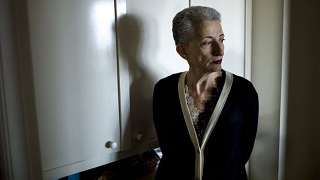
Hélène Cixous (Oran, 5 juni 1937)
De Amerikaanse schrijver en acteur Spalding Gray werd geboren op 5 juni 1941 in Barrington, Rhode Island. Zie ook alle tags voor Spalding Gray op dit blog.
Uit: Life Interrupted
“What did we talk about — we talked about the art critic Robert Hughes’s car accident that he’d had in Australia, and how difficult that would be, to have a car accident in a foreign country like that. Then there was this discussion about who would drive home. We’d all been drinking, not a lot, but Kathie had only had one glass of wine so she was the designated driver. So we’re off and she says, “Buckle up,” and no one in the back seat pays any attention to her. Tara Newman says, “Yes, Mom,” very condescendingly, and I — God, I didn’t hear her; Kathie says it’s because I don’t listen. I just didn’t buckle up. I think I was taking a pee in the bushes, a last-minute pee, and I got in and so we’re off on a backcountry road. I didn’t think anything could possibly happen on a backcountry road. We’d come on a main highway and the speeding was terrific, but on the country road I thought it would be…
Just about one mile from the mansion — and they say these things happen within a mile of your destination, that’s why my friend Donald says that he drives like crazy to get out of that radius — I look up and I see in Kathie’s window what looks like a cartoon of a van. It looks like a video game. I can’t take it in. We had stopped to turn right, we were still, and the road was a narrow country road, there were no lanes, just a road, and coming at me, at us, was this yellow van. It must have been coming very fast, because all I got was one glimpse of it, its headlights. It was dusk, it was ten-fifteen, and there was this enormous crash that I remember as the most violent moment of my life. It was equal to an earthquake that I’d gone through in California, which had sounded like a bomb.
Our car spun around three times, that’s how hard he hit, and he drove the engine right into the front seat of the car, where Kathie burned her arm. Somehow she got out. I thought Kim, who was next to her, was dead. His forehead was down on the dashboard. Tara Newman was yelling, “The car’s going to explode. Everyone get out!” I don’t remember getting out, but the next I knew I was lying in the road next to Kathie, and she’s saying, “I’m dying! I’m dying!” and I’m saying, solipsist that I am, “But I can’t straighten out my leg!” And I couldn’t.”
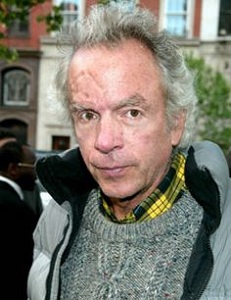
Spalding Gray (5 juni 1941 – 10 januari 2004)
De Ierse dichter, schrijver en schilder Christy Brown werd geboren op 5 juni 1932 in Dublin. Zie ook alle tags voor Christy Brown op dit blog.
Uit: My Left Foot
« That was a momentous decision as far as my future life was concerned. It meant that I would always have my mother on my side to help me fight all the battles that were to come, and to inspire me with new strength when I was almost beaten. But it wasn’t easy for her because now the relatives and friends had decided otherwise. They contended that I should be taken kindly, sympathetically, but not seriously. That would be a mistake. “For your own sake,” they told her, “don’t look to this boy as you would to the others; it would only break your heart in the end.” Luckily for me, Mother and Father held out against the lot of them. But Mother wasn’t content just to say that I was not an idiot: she set out to prove it, not because of any rigid sense of duty, but out of love. That is why she was so successful.
At this time she had the five other children to look after besides the “difficult one,” though as yet it was not by any means a full house. They were my brothers, Jim, Tony, and Paddy, and my two sisters, Lily and Mona, all of them very young, just a year or so between each of them, so that they were almost exactly like steps of stairs.
Four years rolled by and I was now five, and still as helpless as a newly born baby. While my father was out at bricklaying, earning our bread and butter for us, Mother was slowly, patiently pulling down the wall, brick by brick, that seemed to thrust itself between me and the other children, slowly, patiently penetrating beyond the thick curtain that hung over my mind, separating it from theirs. It was hard, heartbreaking work, for often all she got from me in return was a vague smile and perhaps a faint gurgle. I could not speak or even mumble, nor could I sit up without support on my own, let alone take steps. But I wasn’t inert or motionless. I seemed, indeed, to be convulsed with movement, wild, stiff, snakelike movement that never left me, except in sleep. My fingers twisted and twitched continually, my arms twined backwards and would often shoot out suddenly this way and that, and my head lolled and sagged sideways. I was a queer, crooked little fellow.”
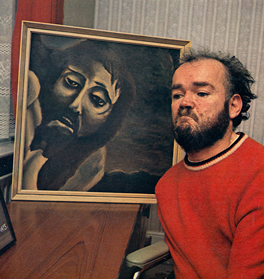
Christy Brown (5 juni 1932 – 6 september 1981)
Hier bij een van zijn eigen schilderijen
De Britse schrijver, dramaturg en regisseur David Hare werd geboren op 5 juni 1947 in Sussex. Zie ook alle tags voor David Hare op dit blog.
Uit:Wall: A Monologue
“From the start the exact route has been controversial. The most obvious path for it to have followed would have been along the international border, established in 1949 between Israel and Jordan, and known to all parties as the Green Line. But in fact, 85 percent of its intended route is inside the West Bank. The fence snakes and coils, departing eastward from the Green Line in places by just two hundred meters, but in other places by as much as twenty-two kilometers where it goes inland to collect up and protect Israeli settlements established far inside the occupied territory. Sometimes it takes in fertile Palestinian agricultural land and water wells, leaving Palestinian farmers without access to their own fields. Some 140,200 Israeli settlers will be living between the fence and the Green Line. 93,000 Palestinians will be caught on the wrong side of the wall.
For that reason the fence is seen by its opponents not as what it claims to be—a security measure—but more as a land grab, the delineation of a de facto claim, an attempt, like the steady expansion of the Israeli-controlled parts of Jerusalem, to do what is known as “change the facts on the ground.” At the outset of the campaign, supporters of Fence for Life insisted that the wall should be a barrier, not a border. It was not to be used as a bargaining tactic in any future negotiation for a final status agreement. But even Israelis have found this intention hard to credit. Before he left office, Israeli Prime Minister Ehud Olmert admitted that had he survived in the job he would have sought to set Israeli permanent borders by 2010—and that the border “would run along or close to the barrier.”
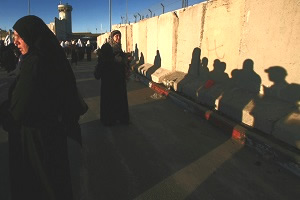
David Hare (Sussex, 5 juni 1947)
Palestijnen bij een checkpoint op weg naar Jeruzalem
De Egyptische schrijfster Alifa Rifaat werd op 5 juni 1930 in Caïro geboren. Zie voor onderstaande schrijfster ook alle tags voor Ailfa Rifaat op dit blog.
Uit: Another Evening at the Club
‘You’re a lucky girl,’ her mother had told her. ‘He’s a real find. Any girl would he happy to have him. He’s an Inspector of Irrigation though he’s not yet forty. He earns a big salary and gets a fully furnished government house wherever he’s posted, which will save us the expense of setting up a house – and I don’t have to tell you what our situation is – and that’s besides the house he owns in Alexandria where you’ll be spending your holidays.’ Samia had wondered to herself how such a splendid suitor had found his way to her door. Who had told him that Mr Mahmoud Barakat, a mere clerk at the Court of Appeal, had a beautiful daughter of good reputation? The days were then taken up with going the rounds of Cairo’s shops and choosing clothes for the new grand life she would be living. This was made possible by her father borrowing on the security of his government pension. Abboud Bey, on his part, never visited her without bringing a present. For her birthday, just before they were married, he bought her an emerald ring that came in a plush box hearing the name of a well-known jeweller in Kasr el-Nil Street. On her wedding night, as he put a diamond bracelet round her wrist, he had reminded her that she was marrying someone with a brilliant career in front of him and that one of the most important things in life was the opinion of others, particularly one’s equals and seniors. Though she was still only a young girl she must try to act with suitable dignity. `Tell people you’re from the well-known Barakat family and that your father was a judge,’ and he went up to her and gently patted her cheeks in a fatherly, reassuring gesture that he was often to repeat during their times together. Then, yesterday evening, she had returned from the club somewhat light-headed from the bottle of beer she had been required to drink on the occasion of someone’s birthday. Her husband, noting the state she was in, hurriedly took her back home. She had undressed and put on her nightgown, leaving her jewellery on the dressing-table, and was fast asleep seconds after getting into bed. The following morning, fully recovered, she slept late, then rang the bell as usual and had breakfast brought to her. It was only as she was putting her jewellery away in the wooden and mother-of-pearl box that she realized her emerald ring was missing.”
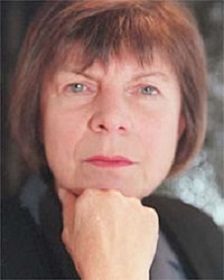
Alifa Rifaat (5 juni 1930 – 4 januari 1996)
De Zwitserse schrijver en uitgever Otto Friedrich Walter werd geboren op 5 juni 1928 in Rickenbach. Zie ook alle tags voor Otto. F. Walter op dit blog.
Uit: Herr Tourel
“Ich möchte für den Augenblick darauf näher nicht eingehen, auf jeden Fall bin ich in bestem Einvernehmen und auf eigenen Wunsch aus der Firma Zoller ausgetreten.
Das war ziemlich genau vor einem Jahr. Am 5. Juni des letzten Jahres. Vier Tage vor meinem Geburtstag. Ich hatte die Absicht, mich für eine gewisse Zeit hier in Jammers, in der Stadt meiner frühen Kindheit, niederzulassen. Das habe ich denn auch getan. Ich habe gleich da vorn Quartier bezogen, an der Tripolisstraße, keine vierhundert Meter von hier entfernt, dem Zementwerk gegenüber im Haus von Immanuel Kupper, Südfrüchte Großhandel. Vom 6. Juni an blieb ich im Tripolisquartier, blieb da bis zum 8. November des letzten Jahres. Gewisse Vorkommnisse bewogen mich, die Stadt meiner frühen Kindheit zum zweitenmal zu verlassen. Das war vor sieben Monaten. Mein Unglück, mein Schicksal oder was immer führte mich gestern, nach einer Reise von sieben Monaten durch die ganze Juragegend, hierher zurück. Ich bin unschuldig, und ich betone hiermit, die über mich ausgestreuten Gerüchte sind mir nicht unbekannt. Ich werde an zuständiger Stelle meine Beschwerden vorbringen. Die Urheber werden zur Verantwortung gezogen werden, und ich werde nicht zögern, die Wahrheit zu sagen.“
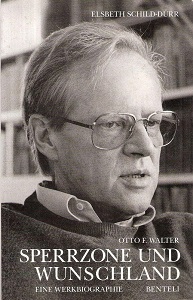
Otto F. Walter (5 juni 1928 – 24 september 1994)
Cover
De Engelse schrijfster Ivy Compton-Burnett werd geboren op 5 juni 1884. Zie ook alle tags voor Ivy Compton-Burnett op dit blog.
Uit: The Mighty And Their Fall
“Agnes first, Hengist second, Leah third!” said Lavinia Middleton, as her sisters and brother contested the access to the cloakroom in the hall. “And don’t be too long. Miss Starkie is waiting for you.” “She told us to stay in the garden.” “Only for half-an-hour. How long have you been?” “Only three-quarters,” said Hengist, as if this was a reasonable difference. “And we are to have the dining-room luncheon. So we don’t have to go upstairs.” “Well, one of you should tell Miss Starkie,” said their sister, leaning back on the hall bench. “I don’t want to, because I am the boy,” said Hengist. “It is not a real reason.” “No one could want to for any reason,” said Leah. “Miss Starkie may not want to wait for her luncheon,” said Agnes. “She ought not to mind,” said Hengist. “She should be thinking of higher things.” “Nothing could be higher than food,” said Leah. “Perhaps it is too high for her.” They broke into mirth and continued their talk, a short, sturdy pair of eleven and ten, with broad, sallow faces, dark, deep-set eyes and an almost saturnine aspect. Something about them, when together, suggested the sympathy between them. Agnes was a mild-looking girl of fourteen, with blue eyes, narrower features and a placid but resolute expression. “What is the jest?” said their elder brother, coming up to his sister on the bench. “Miss Starkie. Something about her thinking of food.” “I used to be surprised that she did. It seemed to reduce her to our level.” “Or to raise her to it,” said Leah. “Food is on the heights.” “Well, I feel just about on a line with it at the moment,” said Miss Starkie’s voice. “So I have come down to pursue it, as no one came up to me. I suppose you are to have your share downstairs today.” “We were just going to tell you,” said Agnes. “I have had to take the will for the deed. It is already later than usual.” “Were you assailed by pangs of hunger?” said Hengist. “Well, by something milder than those. But I did feel Nature’s reminder.”
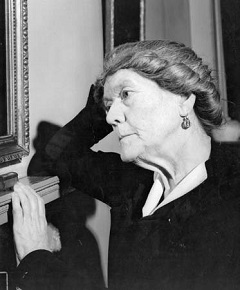
Ivy Compton-Burnett (5 juni 1884 – 27 augustus 1969)

2 thoughts on “Thomas Kling, Hélène Cixous, Spalding Gray, Christy Brown, David Hare, Alifa Rifaat, Otto F. Walter, Ivy Compton-Burnett”
De commentaren zijn gesloten